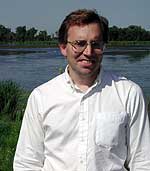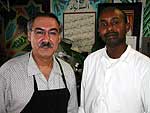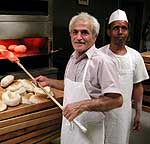By Rob Schmitz
Minnesota Public Radio
August 14, 2002
In Fairbault, a U.S. Department of Agriculture employee is making a special effort to reach out to Minnesota's growing immigrant population. Gregg Bongard thinks he's discovered a new approach to farming that could change the face of agriculture in the U.S.
| |
|
|
|
||
A couple of years ago, Gregg Bongard visited a farm in Northfield owned by a Hmong family. That day, he says, he saw the future of farming in America.
"We were out there on the farm with the young family, and the three or four-year-old was napping in the van. They called for him, and the first thing that he grabbed when he woke up was a hoe," Bongard says. "We all just kind of looked. There he was with a hoe."
Bongard works with the Farm Service Agency, a branch of the USDA that acts as a lender for farmers.
For Bongard, the toddler standing with a hoe is an image with big implications. Bongard says nowadays, farmers usually own thousands of acres planted with one or two cash crops, much of it grown for export.
But he thinks this trend may be challenged soon by the state's newest faces - Hmong, Somali, Ethiopian, and Iraqi - all who came with centuries of farming tradition.
Bongard says some of them have figured out how to make farming much more profitable, while using a fraction of the resources of the average cash cropper. The answer, Bongard says, can be found in many ways new immigrant farmers do business.
| |
|
|
|
||
A big, modern farm can have $500,000 invested in machinery. Bongard says immigrant farmers can cut that down to around $5,000 to $10,000.
"Many of these minorities use machinery that you would've thought they found lying by the side of the road," Bongard says.
Immigrant farms are also more labor-intensive, but they don't have to buy or maintain expensive machinery. As a result, they often get larger returns on their farm than big farms that operate on razor-thin margins.
In addition, Bongard says, most immigrant producers aim their goods at a local niche market - cutting distribution costs, and increasing their profits.
On a recent day, Bongard visits Minneapolis to meet with Sami Rasouli and Bile Soldat. Rasouli is from Iraq and Soldat is from Somalia. Both are Muslim business owners that want to start farming.
Bongard arrives at Sinbad's, a restaurant on Nicollet Ave., owned by Rasouli. Rasouli is in the back of the restaurant, helping his master baker make pita bread. The two make the bread from scratch, kneading and pounding the dough. Rasouli serves this bread at his restaurant.
| |
|
|
|
||
Bongard is not here to talk about bread. He's here to talk about meat - specifically, goat and lamb meat. Rasouli serves Halal meat at his restaurant - meat from animals ritually slaughtered in Muslim tradition.
Currently, Rasouli has to have the meat shipped from Australia, New Zealand, or Uruguay, because there isn't a stable supplier of Halal meat in the United States. The meat is slaughtered abroad, and then it takes three months to arrive to his store in a frozen crate.
Rasouli says each store in the Twin Cities that sells Halal meat goes through a 40,000-pound crate of it each month. Each crate costs $60,000.
Rasouli and Bile Soldat, the Somali owner of the Minnesota Halal Market in Minneapolis, sit and chat with Bongard over some Turkish coffee.
Rasouli tells Bongard that he and the 14 other Halal meat dealers in the Twin Cities have decided it's about time to start raising and supplying their own meat.
"Fifteen stores in the Twin Cities alone each need a container. This is a huge amount," says Rasouli. "The Somali community increased rapidly in the state of Minnesota, and don't forget there are many of them in other cities and other states that use this product, too. So if we have this project available and materialize, I think this will be a big supplier in the state and across the nation."
|
"Probably one day, you'll hear of Little Somalia or Little Baghdad next to Ortonville by creating this."
- Sami Rasouli, owner of Sinbad's Cafe in Minneapolis, who plans to open a meat processing plant in rural Minnesota |
Unlike many of their immigrant peers, neither Rasouli nor Soldat have any farming experience. The closest Rasouli came was in the 1970s, when the Iraqi government forced him to leave Baghdad to teach at school in the countryside. But together they have an impressive business acumen, and they're getting extra help from Bongard.
Rasouli and Soldat want to become the first stable supplier of goat and lamb meat in the United States. Bongard is helping them by putting them in touch with already existing sheep and goat herders around the state, as well as introducing them to bankers, government and non-profit agencies that might be able to assist them.
Bongard says the biggest challenge at this point is finding a lender for their business. Rasouli explains why.
"To get a loan - which is in Arabic 'khorbahassana' - this means a loan with good intention, or loan without interest," says Rasouli.
The Qu'ran forbids charging interest on a loan.
Bongard hopes he can help Rasouli and Soldat find a lender who will give them a fixed rate on their loan that would be capitalized as principal, and then could be paid in advance.
Rasouli says they are more than ready to take out the loan for the business, and he says they even have a location for the business in mind.
In April, the small western Minnesota town of Ortonville invited Rasouli to talk to local business leaders about Islam. With the contacts Rasouli made on that trip, he and Soldat plan to locate their slaughterhouse and distribution center in the town.
They plan to hire between 100 and 200 employees, from both the local population and a population of Muslims in the Twin Cities who want to resettle in a rural area.
Rasouli says this move to the countryside will not only help develop Ortonville, but will also bring many from the Twin Cities' Muslim population back to the land, and back to tradition.
"Lots of Somali and Arab people - they send their families to Arab countries to learn the religion and the language and the culture, and bring them back when they are ready to go to college. So instead of doing that, they can build their own community. Probably one day, you'll hear of Little Somalia or Little Baghdad next to Ortonville by creating this," says Rasouli.
On the way home from Minneapolis, Bongard reflects on his day with Rasouli and Soldat, comparing them with his other immigrant clients.
A lover of history, Bongard starts talking about the first farmers in this state - he uses the word "forefathers." He says most of Minnesota's forefathers who settled the land after the Civil War ended up failing at farming.
As he watches the green blur of soy and corn fields from the car, Bongard says he has a hunch this new wave of forefathers will finally get it right.
More from MPRMore Information



